英语常用短语的用法与练习(13)
Unit 1语法 短语类型及用法练习高一英语(人教版2019必修1)

Unit 1语法短语类型及用法练习高一英语(人教版2019必修1)名词短语是以一个名词为中心构成的短语,语法功能相当于名词。
它由几个名词或名词及其修饰语构成。
名词短语比起单个名词表述得更加具体、形象。
1.常见的名词短语(1)冠词+形容词+名词an exciting experience一次激动人心的经历 a long history 一段悠久的历史(2)冠词+名词+介词+名词a piece of bread一块面包 a glass of water一杯水(3)名词所有格+名词Tom’s book 汤姆的书today’s newspaper今天的报纸(4)名词 +to/with/for介词短语① the way to success 成功之道②a man with good manners有礼貌的人③books for children 儿童读物(5)名词作定语的名词短语railway station 火车站 shoe factory 鞋厂silk dress 丝绸连衣裙 glass cup玻璃杯2.名词短语的句法功能(1)名词短语作主语(谓语动词的单复数一般与名词短语的中心词保持一致)The flower shop is just around the corner and you won’t miss it.花店就在拐角处,你一定会找到它的。
(2)名词短语作宾语I want to have a trip to Europe.我想去欧洲旅行。
(3)名词短语作表语This is an exciting experience which will never be forgotten.这是一次激动人心、永远难以忘怀的经历。
形容词短语形容词短语是由几个形容词或形容词及其修饰语构成的短语。
1. 常见的形容词短语(1)两个或多个形容词可以由and,but等连词连接,构成形容词短语。
safe and sound安然无恙young but clever年纪小但聪明(2)very等程度副词作修饰语时,可与形容词构成形容词短语,以加深形容词的程度。
高中重点短语归纳总结英语

高中重点短语归纳总结英语英语作为国际通用语言,在高中阶段的学习中具有重要的地位。
学好英语不仅可以帮助我们更好地与世界沟通交流,还有助于提高我们的综合素养。
在英语学习中,短语的正确运用是提高自己语言表达能力的关键。
下面是对高中英语学习中常见的重点短语进行归纳总结。
一、常见短语1. break down: 出故障,崩溃例句:The car broke down on the road, so we had to call for a mechanic.(汽车在路上出了故障,因此我们不得不叫来一个机械师。
)2. carry out: 执行,实施例句:The government should carry out more effective measures to reduce air pollution.(政府应该采取更有效的措施来减少空气污染。
)3. look forward to: 期待例句:I'm really looking forward to the summer vacation.(我真的很期待暑假。
)4. give up: 放弃例句:Don't give up even when things get tough.(即使事情变得困难,也不要放弃。
)5. make up: 编造,化妆例句:She made up an excuse for being late.(她编了个晚到的借口。
)6. put off: 推迟例句:The meeting was put off until next week due to the bad weather.(由于天气不好,会议被推迟到下周。
)7. set up: 建立,设立例句:They set up a charity organization to help those in need.(他们建立了一个慈善组织来帮助有需要的人。
)8. take place:发生,举行例句:The concert will take place in the park tomorrow evening.(音乐会将在明晚在公园举行。
人教版九年级全册英语第十三单元Unit13《单词+短语+句子》默写专项练习(含答案)

UNIT 13 We're trying to save the earth!
Section A(1a-4c)
[限时:15分钟]
重点单词
1. n. 优点;有利条件
2. v. 花费n. 花费;价钱
3. adj. 木制的;木头的
4. adj. 有害的
5. n. 工业;行业
6. adj. 科学上的;科学的
7. n. 垃圾;废弃物v. 乱扔
8. adj. 残酷的;残忍的
9. n. 渔民;钓鱼的人
10. v. 承担得起(后果);买得起
11. adj. 丑陋的;难看的12. n. 煤;煤块
13. n. 塑料;塑胶adj. 塑料的 14. n. 法律;法规
15. adj. 现在的n. 现在;礼物
词形变换
1. advantage—(反义词)
2. wood—(形容词)
3. harm—(形容词)—(反义词)
4. science—(名词)—(形容词)
5. reuse —(形容词)
6. fisherman —(复数)
7. law—(名词,律师)
重点短语
1. 对……有害
2. 在……顶部或顶端
3. 参加
4. 付费;付出代价
5. 采取行动
6. 减少
7. 参与
8. 处于危险中9. 加起来10. 导致11. 听说
1/ 6。
现在分词短语的用法及例句
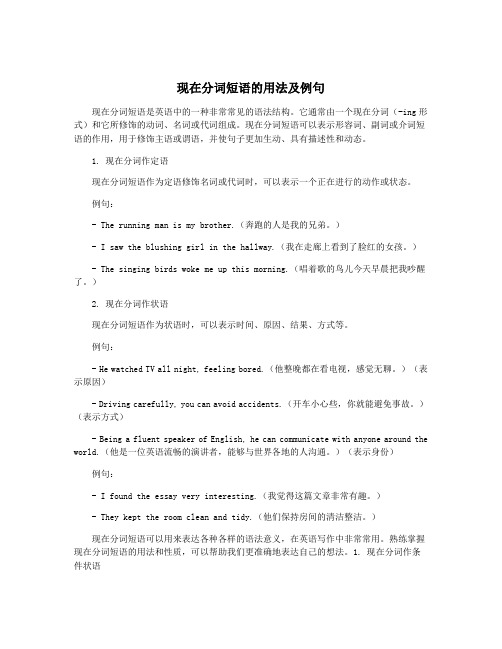
现在分词短语的用法及例句现在分词短语是英语中的一种非常常见的语法结构。
它通常由一个现在分词(-ing形式)和它所修饰的动词、名词或代词组成。
现在分词短语可以表示形容词、副词或介词短语的作用,用于修饰主语或谓语,并使句子更加生动、具有描述性和动态。
1. 现在分词作定语现在分词短语作为定语修饰名词或代词时,可以表示一个正在进行的动作或状态。
例句:- The running man is my brother.(奔跑的人是我的兄弟。
)- I saw the blushing girl in the hallway.(我在走廊上看到了脸红的女孩。
)- The singing birds woke me up this morning.(唱着歌的鸟儿今天早晨把我吵醒了。
)2. 现在分词作状语现在分词短语作为状语时,可以表示时间、原因、结果、方式等。
例句:- He watched TV all night, feeling bored.(他整晚都在看电视,感觉无聊。
)(表示原因)- Driving carefully, you can avoid accidents.(开车小心些,你就能避免事故。
)(表示方式)- Being a fluent speaker of English, he can communicate with anyone around the world.(他是一位英语流畅的演讲者,能够与世界各地的人沟通。
)(表示身份)例句:- I found the essay very interesting.(我觉得这篇文章非常有趣。
)- They kept the room clean and tidy.(他们保持房间的清洁整洁。
)现在分词短语可以用来表达各种各样的语法意义,在英语写作中非常常用。
熟练掌握现在分词短语的用法和性质,可以帮助我们更准确地表达自己的想法。
1. 现在分词作条件状语当现在分词短语与 if 或 when 连用时,可以表示一个条件或情况。
初中重要英语短语用法汇总
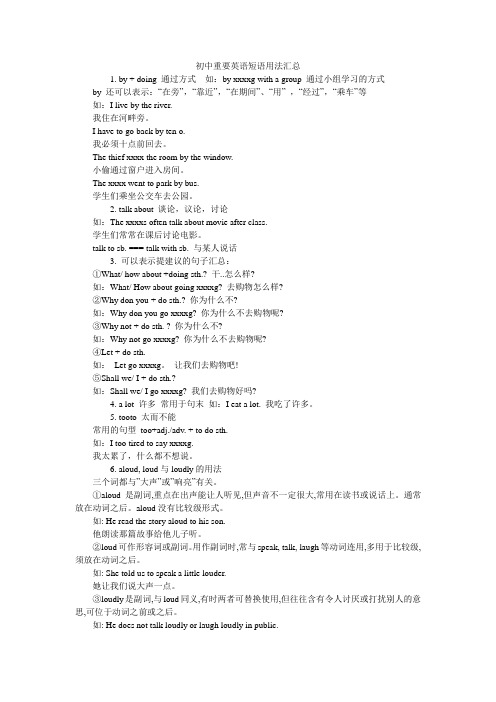
初中重要英语短语用法汇总1. by + doing 通过方式如:by xxxxg with a group 通过小组学习的方式by 还可以表示:“在旁”,“靠近”,“在期间”、“用” ,“经过”,“乘车”等如:I live by the river.我住在河畔旁。
I have to go back by ten o.我必须十点前回去。
The thief xxxx the room by the window.小偷通过窗户进入房间。
The xxxx went to park by bus.学生们乘坐公交车去公园。
2. talk about 谈论,议论,讨论如:The xxxxs often talk about movie after class.学生们常常在课后讨论电影。
talk to sb. === talk with sb. 与某人说话3. 可以表示提建议的句子汇总:①What/ how about +doing sth.? 干..怎么样?如:What/ How about going xxxxg? 去购物怎么样?②Why don you + do sth.? 你为什么不?如:Why don you go xxxxg? 你为什么不去购物呢?③Why not + do sth. ? 你为什么不?如:Why not go xxxxg? 你为什么不去购物呢?④Let + do sth.如:Let go xxxxg。
让我们去购物吧!⑤Shall we/ I + do sth.?如:Shall we/ I go xxxxg? 我们去购物好吗?4. a lot 许多常用于句末如:I eat a lot. 我吃了许多。
5. tooto 太而不能常用的句型too+adj./adv. + to do sth.如:I too tired to say xxxxg.我太累了,什么都不想说。
6. aloud, loud与loudly的用法三个词都与”大声”或”响亮”有关。
高中英语常用单词词组的用法和例句
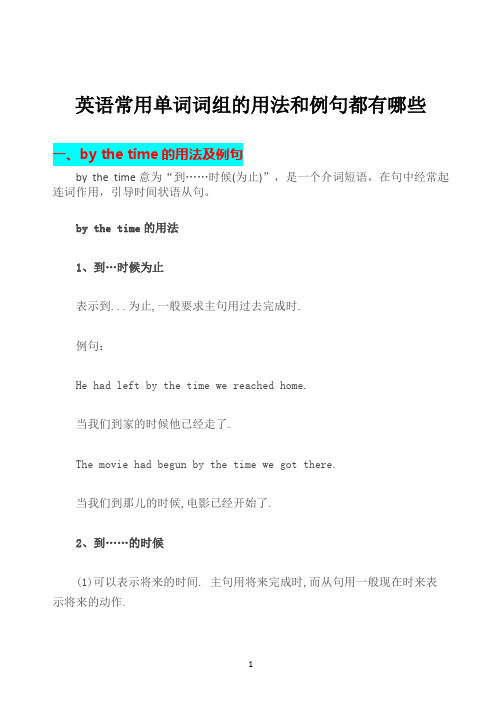
英语常用单词词组的用法和例句都有哪些一、by the time的用法及例句by the time意为“到……时候(为止)”,是一个介词短语,在句中经常起连词作用,引导时间状语从句。
by the time的用法1、到…时候为止表示到...为止,一般要求主句用过去完成时.例句:He had left by the time we reached home.当我们到家的时候他已经走了.The movie had begun by the time we got there.当我们到那儿的时候,电影已经开始了.2、到……的时候(1)可以表示将来的时间. 主句用将来完成时,而从句用一般现在时来表示将来的动作.I will have finished the work by the time my father comes back.(2)可以表示过去的时间. 主句用过去完成时,而从句用一般过去时.He had built a lab for himself by the time he was 12 years old.注:如果只是说过去某个时候的状况,用过去时,而不用完成时。
例句: By the time the war was over , death and suffering were to be seen everywhere.在战争结束的时候,到处可见死亡和饥饿。
这里没有“死亡和饥饿”已经完成的意思,只是描述当时这个时间点的状况。
所以用过去时。
二、beneficial的用法搭配及例句beneficial:形容词,意为有益的;有利的;有帮助的,侧重对健康、身心或事业有益。
beneficial后面通常加for 或to,构成搭配be beneficial for和be beneficial to。
1 beneficial的用法英[benɪ'fɪʃ(ə)l] 美[,bɛnɪ'fɪʃl]adj. 有益的,有利的;可享利益的例句:1、I have mentioned a number of times the beneficial effects of music playedto the unborn child.我已数次谈及给未出生孩子播放音乐的益处。
英语不定式(短语)用法全解析

英语不定式(短语)用法全解析摘要本文介绍了英语不定式(短语)的定义、形式和用法,并重点分析了不定式(短语)在句中作主语、表语、宾语和补足语的功能和特点。
本文还提供了一些例句和练习题,帮助读者理解和掌握不定式(短语)的用法。
一、什么是不定式(短语)1.1 不定式的定义不定式是动词的一种非谓语形式,在句中不能单独作谓语。
不定式具有动词的性质,它可以有自己的宾语和状语,从而构成不定式短语。
不定式也具有非动词的性质,相当于一个名词、形容词或副词,可以在句中担任主语、宾语、宾语补足语、表语、定语和状语等成分。
1.2 不定式的形式不定式的基本形式是由不定式符号to+动词原形构成,在某些情况下to也可省略。
不定式还可以有形式的变化,即一般式、进行式、完成式和被动式。
形式结构意义一般式to do表示与谓语动作同时或几乎同时发生,或在谓语动作之后发生的动作进行式to be doing表示正在进行的或与谓语动作同时发生的动作完成式to have done表示在谓语动作之前发生的动作完成进行式to have been doing表示在谓语动作之前发生并且一直进行着的动作被动一般式to be done表示被动意义,即逻辑上的主语是这个不定式表示的动作的承受者被动完成式to have been done表示被动意义,且在谓语动作之前已经完成的动作否定形式not to do表示否定意义,即逻辑上的主语没有做或不会做这个不定式表示的动作二、不定式(短语)在句中的用法2.1 不定式(短语)作主语不定式(短语)具有名词的特征,可在句子中充当主语。
不定式(短语)在句首作主语To know oneself is difficult. 人贵有自知之明。
用it作形式主语在很多情况下,人们通常用it作为形式上的主语,而把不定式(短语)移到谓语之后,使句子结构显得平稳一些。
It's rude to turn your back to your teacher and refuse to answer. 背对着老师,拒绝回答问题是不礼貌的。
英语常用连词大全及其例句
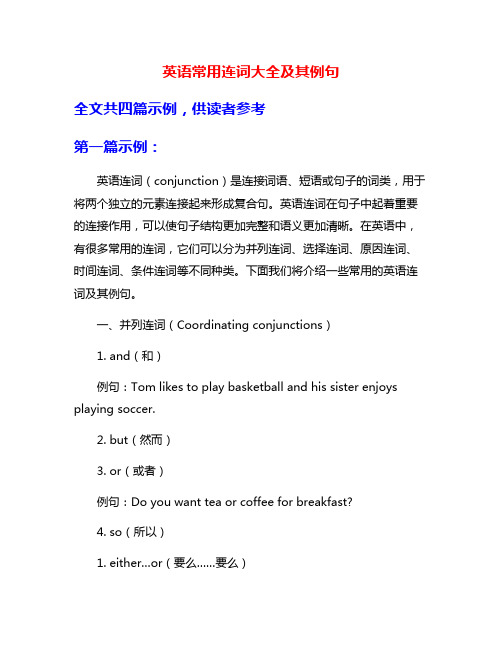
英语常用连词大全及其例句全文共四篇示例,供读者参考第一篇示例:英语连词(conjunction)是连接词语、短语或句子的词类,用于将两个独立的元素连接起来形成复合句。
英语连词在句子中起着重要的连接作用,可以使句子结构更加完整和语义更加清晰。
在英语中,有很多常用的连词,它们可以分为并列连词、选择连词、原因连词、时间连词、条件连词等不同种类。
下面我们将介绍一些常用的英语连词及其例句。
一、并列连词(Coordinating conjunctions)1. and(和)例句:Tom likes to play basketball and his sister enjoys playing soccer.2. but(然而)3. or(或者)例句:Do you want tea or coffee for breakfast?4. so(所以)1. either…or(要么……要么)3. both…and(既……又……)4. not only…but also(不仅……而且……)1. because(因为)5. in order to(为了)1. when(当……时候)3. before(在……之前)5. as soon as(一……就……)1. if(如果)2. unless(除非)3. provided that(只要)5. even if(即使)总结:以上列举了一些常用的英语连词及其例句,希望对大家学习和理解英语连词有所帮助。
在写作或口语表达中,正确使用连词可以使句子更加连贯和表达更加清晰,因此多加练习和应用是十分重要的。
希术这篇文章可以帮助您更好地掌握英语连词的用法,提高自己的英语表达能力。
第二篇示例:英语中的连词是连接短语、句子或句子的词汇,通过使用连词,可以使句子结构更加丰富多彩,表达更为准确清晰。
在英语中,常用的连词有很多种,包括并列连词、从属连词等。
接下来就让我们一起来学习一下英语中常用的连词及其例句吧!一、并列连词1. and(而且、和)- I like to read books and listen to music in my free time.(我喜欢在空闲时间看书和听音乐。
英语常用短语的用法与练习

英语常用短语的用法与练习(8)36. come into being 形成;产生,发生,出现(不可用于被动语态或进行时);例句:①We do not know when this world came into being. 我们不知道世界是何时形成的。
②When did the Roman Empire come into being?罗马帝国是什么时候形成的?③Magazines come into being to voice the new sentiments in the air.鼓吹新风尚的刊物纷纷问世。
短语:come into existence 形成;产生;开始存在;come into effect/ force/ operation开始生效;开始实施;come into use 开始被使用;come into power上台执政;come into fashion 开始流行;come into office 就职;come into action 开始行动;配套练习:单项填空:①Before the computer ____ , people could never imagine it could bring about such great changes to human life.A. came into beingB. was discoveredC. was come into beingD. was formed②Once a bad man comes into _____, the people of that country will suffer a lot.A. energyB. officeC. powerD. nation③It is said that this old building has _____ for more than three hundred years.A.existedB.appearedC.been builte into being④Do you know when did the world _____?A. come into beingB. comeC. formedD. existed37. come to life 复活;苏醒;变得活跃;恢复生气;例句:①I love to watch everything come to life in spring. 我喜欢看到春天万象更新。
高三英语语法复习十三:形容词和副词
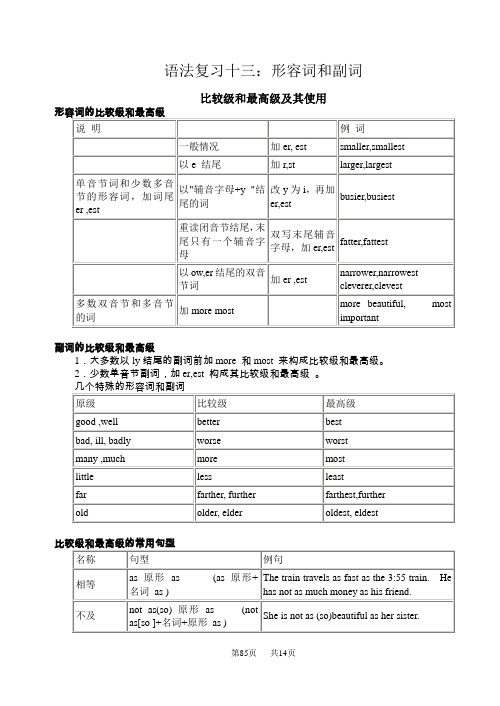
语法复习十三:形容词和副词比较级和最高级及其使用副词的比较级和最高级1.大多数以ly结尾的副词前加more 和most 来构成比较级和最高级。
2.少数单音节副词,加er,est 构成其比较级和最高级。
比较级结构的修饰语1.用于原级之前:a l m o s t,n e a r l y,j u s t, e x a c t l y,q u i t e,h a l f, t w i c e,t h r e et i m e s,at h i r d,e t c.J o h n i sa l m o s t a st a l l a s y o u.T h er i v e r i st h r e e t i m e sa s l o n g a st h a t o n e.W e h a v e a t h i r d a s m a n y s t u d e n t s a sw e h a d l a s tt e r m.2.用于比较级前m a n y,af e w(用于"m o r e+可数名词"前)I t t a k e sm a n y m o r eh o u r s t o g ot h e r e b yt r a i n t h a n b yp l a n e.a l o t,m u c h,a b i t,e v e n,al i t t l e,s t i l l,ag r e a t d e a l,f a r,r a t h e r,t w o y e a r s,t e np e r c e n t,t h r ee t i m e s e t c.I t'sc o ld t h i sy e a r,b u ti t's e v e nc o lde r l a s ty e a r.W ep r o d u c e d6%m o r e g r a i nt h i s y e a rt h a n w e d i dl a s t y e a r.3.用于形容词和最高级前t h e v e r y, m u c h t h e,b yf a r t h e,t h ef i r s t/s e c o n dT h i s h a ti s b y f a r t h el a r g e s t i nt h e w o r l d.G o l d i st h e v e r y m o s tv a l u a b l e o fa l lm a t e r i a l s.位置与功能高考重点要求1.掌握形容词、副词比较级、最高级的常用句型及用法2.掌握形容词、副词的原级、比较级和最高级修饰语及倍数的比较表达。
英语常用短语的用法与练习

英语常用短语的用法与练习(14)66. get away with被放过;(做坏事)不受惩罚;例句:①If you cheat in the exam, you’ll never get away with it.考试作弊必予追究。
②I won’t have you getting away with cheating in the exam.我不能容忍你考试作弊而不受惩罚。
③He’s not very good at getting his ideas across.他不太善于清楚地表达自己的思想。
④We should get rid of the bad style and keep the good. 我们应该摒弃不良作风,保持优良作风。
短语:get across=put across (使)被理解;(把……)讲清楚;get rid of 摆脱;除掉;get away (from) (从)……脱离,逃脱……;get down to (doing)sth. 开始认真地做某事;get in 插话;收获;get in touch with 与……取得联系;get into the habit of... 染上……的习惯;get into trouble 陷入困境;get out (of ...) 出去,离开,逃脱,摆脱;get hold of 抓住;get on/along well with...与……相处得好;进展顺利(多用进行时);get over 爬过……;克服(困难);从……中恢复过来;get through 完成;花光(时间、金钱等);通过;接通电话;配套练习:(1). 单项填空:①His mother had thought is would be good for his character to_____from home and earn some money on his own.A. run away B take away C.keep away D.get away②As soon as he got to the office, he______ the students’ papers.A. got down to correctB. got down to correctingC. set down to correctingD. sit down to correcting③The final examination is coming up soon. It's time for us to ____ our studies.A. get down toB. get outC. get back forD. get over④The final examination is coming up soon. It’s time for us to _____ our studies.A. get down toB. get outC. get back forD. get over(2). 完成句子:①To my surprise, the baby wolf _______ (与……相处得不错) the dogs and then managed to survive.②She never arrives on time at the office, but she somehow managed to ______ (侥幸逃脱) it.③Well, stop chatting. It’s time we _______ (开始,着手) some serious work.④The news was a terrible blow to her, but she will ______ (从……恢复过来) the shock soon.67. get into陷入;染上(坏习惯);例句:①I’m really getting into jazz these days.近来我喜欢上爵士乐了。
英语常用短语的用法与练习(4)

英语常用短语的用法与练习(4)16. belong to属于;是……的成员;是……的一部分;用法:belong vi. 应被放置在,应处在(某处),适合在某处。
此时,不与to连用,后面通常跟副词和其他介词短语。
belongings n.财产;所有物;行李;belong to不用于进行时态和被动语态中。
to 为介词,其后接代词、名词类短语及从句,表示所归属的对象。
例句:①Who does this watch belong to? 这块表是谁的?②She lost all her belongings in the earthquake. 她在地震中失去了所有的财产。
③I don’t really feel I belong here. 我感觉我并不适合待在这个地方。
配套练习:单项填空:①As is known to us all, China is a developing country _____ the third world.A. belongingB. belongedC. belonging toD. belonged to②The railways in China belong to ______, whereas the ones in Japan, to the private..A. the nationB. the countryC. the stateD. the land③Which of the following groups doesn’t belong to the same category?A. cows, bulls, oxenB. lamb, sheep, goatsC. dog, ram, houndD. hen, cock, chick④There are four basic _____ of blood in the human body. What do you belong to, A, B, AB or O?A. kindsB. sortsC. typesD. classes⑤Christopher Marlore (1564—95) was a writer belonging to ______of Shakespeare.A. the periodB. a timeC. an ageD. day17. block out 挡住(光线);标示街区;写出…提纲例句:①That wall blocks out all the light. 那堵墙把光线都遮住了。
高中英语固定搭配和常用短语用法归纳

高中英语词组固定搭配一、接不定式(而不接动名词)作宾语的24个常用动词afford to do sth。
负担得起做某事agree to do sth。
同意做某事arrange to do sth。
安排做某事ask to do sth。
要求做某事beg to do sth. 请求做某事care to do sth. 想要做某事choose to do sth. 决定做某事decide to do sth。
决定做某事demand to do sth. 要求做某事determine to do sth。
决心做某事expect to do sth。
期待做某事fear to do sth. 害怕做某事help to do sth. 帮助做某事hope to do sth。
希望做某事learn to do sth. 学习做某事manage to do sth。
设法做某事offer to do sth. 主动提出做某事plan to do sth。
计划做某事prepare to do sth. 准备做某事pretend to do sth。
假装做某事promise to do sth。
答应做某事refuse to do sth。
拒绝做某事want to do sth。
想要做某事wish to do sth。
希望做某事注:有些不及物动词后习惯上也接不定式,不接动名词:aim to do sth。
打算做某事fail to do sth. 未能做某事long to do sth. 渴望做某事happen to do sth。
碰巧做某事hesitate to do sth. 犹豫做某事struggle to do sth。
努力做某事二、接不定式作宾补的36个常用动词advise sb。
to do sth. 建议某人做某事allow sb. to do sth。
允许某人做某事ask sb. to do sth.请(叫)某人做某事bear sb. to do sth.忍受某人做某事beg sb. to do sth。
英语常用短语(引用其他文档)
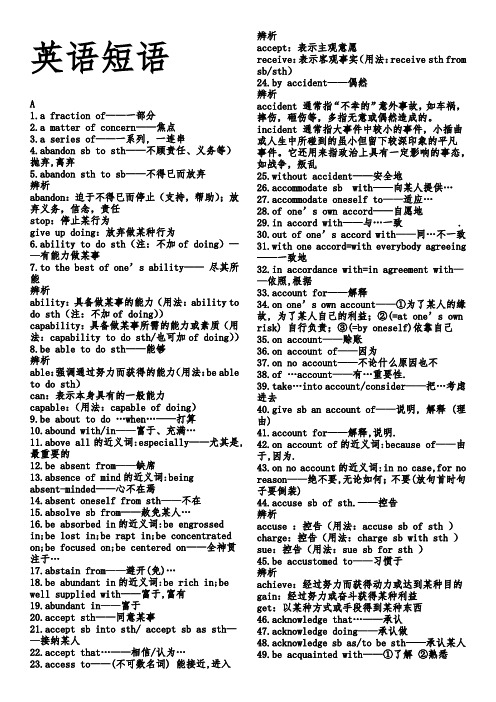
英语短语A1.a fraction of——一部分2.a matter of concern——焦点3.a series of——一系列, 一连串4.abandon sb to sth——不顾责任、义务等)抛弃,离弃5.abandon sth to sb——不得已而放弃辨析abandon:迫于不得已而停止(支持,帮助);放弃义务,信念,责任stop:停止某行为give up doing:放弃做某种行为6.ability to do sth(注:不加of doing)——有能力做某事7.to the best of one’s ability——尽其所能辨析ability:具备做某事的能力(用法:ability to do sth(注:不加of doing))capability:具备做某事所需的能力或素质(用法:capability to do sth/也可加of doing))8.be able to do sth——能够辨析able:强调通过努力而获得的能力(用法:be able to do sth)can:表示本身具有的一般能力capable:(用法:capable of doing)9.be about to do …when…——打算10.abound with/in——富于、充满…11.above all的近义词:especially——尤其是, 最重要的12.be absent from——缺席13.absence of mind的近义词:beingabsent-minded——心不在焉14.absent oneself from sth——不在15.absolve sb from——赦免某人…16.be absorbed in的近义词:be engrossedin;be lost in;be rapt in;be concentrated on;be focused on;be centered on——全神贯注于…17.abstain from——避开(免)…18.be abundant in的近义词:be rich in;be well supplied with——富于,富有19.abundant in——富于20.accept sth——同意某事21.accept sb into sth/ accept sb as sth——接纳某人22.accept that…——相信/认为…23.access to——(不可数名词) 能接近,进入辨析accept:表示主观意愿receive:表示客观事实(用法:receive sth fromsb/sth)24.by accident——偶然辨析accident 通常指“不幸的”意外事故,如车祸,摔伤,砸伤等,多指无意或偶然造成的。
高中英语固定搭配和常用短语用法归纳

高中英语词组固定搭配一、接不定式(而不接动名词)作宾语的24个常用动词affordtodosth.负担得起做某事agreetodosth.同意做某事arrangetodosth.安排做某事asktodosth.要求做某事begtodosth.请求做某事caretodosth.想要做某事choosetodosth.决定做某事decidetodosth.决定做某事demandtodosth.要求做某事determinetodosth.决心做某事expecttodosth.期待做某事feartodosth.害怕做某事helptodosth.帮助做某事hopetodosth.希望做某事learntodosth.学习做某事managetodosth.设法做某事offertodosth.主动提出做某事plantodosth.计划做某事preparetodosth.准备做某事pretendtodosth.假装做某事promisetodosth.答应做某事refusetodosth.拒绝做某事wanttodosth.想要做某事wishtodosth.希望做某事注:有些不及物动词后习惯上也接不定式,不接动名词:aimtodosth.打算做某事failtodosth.未能做某事longtodosth.渴望做某事happentodosth.碰巧做某事hesitatetodosth.犹豫做某事struggletodosth.努力做某事二、接不定式作宾补的36个常用动词.建议某人做某事.允许某人做某事.请(叫)某人做某事.忍受某人做某事.请求某人做某事.导致某人做某事.命令某人做某事.驱使某人做某事.选举某人做某事.鼓励某人做某事.期望某人做某事.禁止某人做某事.强迫某人做某事.使(要)某人做某事.讨厌某人做某事.帮助某人做某事.打算要某人做某事.邀请某人做某事.留下某人做某事.喜欢某人做某事.打算要某人做某事.需要某人做某事.迫使某人做某事.命令某人做某事.允许某人做某事.说服某人做某事.宁愿某人做某事.要求某人做某事.提醒某人做某事.教某人做某事.告诉某人做某事.训练某人做某事.麻烦某人做某事.想要某人做某事.警告某人做某事.希望某人做某事注:不要受汉语意思的影响而误用以下动词句型:汉语说:“害怕某人做某事”,但英语不说.。
高考英语常用动词短语
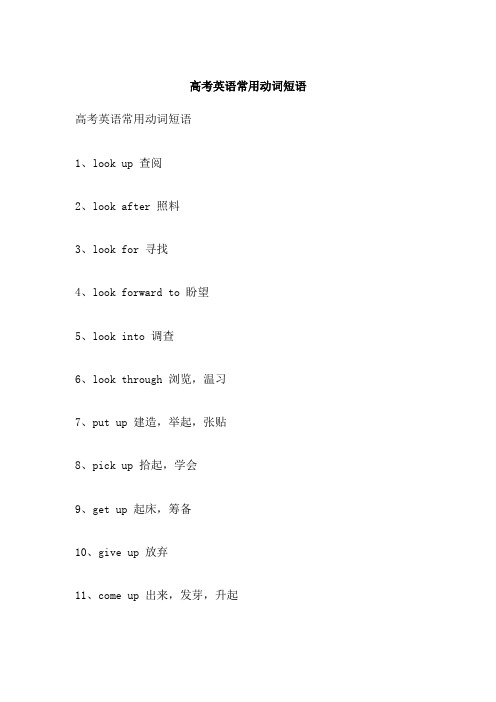
高考英语常用动词短语高考英语常用动词短语1、look up 查阅2、look after 照料3、look for 寻找4、look forward to 盼望5、look into 调查6、look through 浏览,温习7、put up 建造,举起,张贴8、pick up 拾起,学会9、get up 起床,筹备10、give up 放弃11、come up 出来,发芽,升起12、catch up 赶上13、keep up 保持14、hold up 举起,阻挡15、cut up 切碎16、call up打电话,使…想起17、set up 建立,开业18、sit up 熬夜,坐直19、come down 下来,崩溃,失败20、come along 随同21、come on 赶快,上演,出台,播放22、come in 进来,上市,得到批准23、come out 出来,出版,结果是24、come from 来自,出生在,由……制成25、go on 继续,播放,举办,播放26、go out 出去,熄灭27、go over 检查,复习28、go ahead 干吧,进展,用吧29、go through 通过,审查,完成30、go up 上涨,建造起31、go along with 附和,支持32、fill up 填满33、get on 上车,穿上,上演,举办,播放34、get down 下来,落下,记下,拿下,播放学而时习之高中英语常用短语动词高中英语常用短语动词是指在英语语法中常用的一些动词短语,它们在日常交流和学习中非常常见。
掌握这些短语动词对于提高英语口语和写作能力非常重要。
在高中英语中,一些常用的短语动词包括:1、"get" 短语动词"get" 是一个非常常用的动词,后面加上不同的介词可以构成很多短语动词。
例如:1、get up:起床2、get dressed:穿衣服3、get down:下车4、get along:相处5、get through:完成2、"put" 短语动词"put" 也是一个常用的动词,加上不同的介词可以构成很多短语动词。
初中英语常用的介词短语
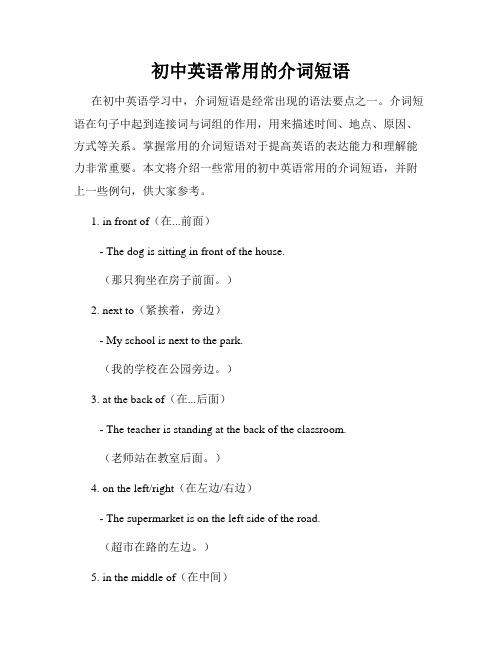
初中英语常用的介词短语在初中英语学习中,介词短语是经常出现的语法要点之一。
介词短语在句子中起到连接词与词组的作用,用来描述时间、地点、原因、方式等关系。
掌握常用的介词短语对于提高英语的表达能力和理解能力非常重要。
本文将介绍一些常用的初中英语常用的介词短语,并附上一些例句,供大家参考。
1. in front of(在...前面)- The dog is sitting in front of the house.(那只狗坐在房子前面。
)2. next to(紧挨着,旁边)- My school is next to the park.(我的学校在公园旁边。
)3. at the back of(在...后面)- The teacher is standing at the back of the classroom.(老师站在教室后面。
)4. on the left/right(在左边/右边)- The supermarket is on the left side of the road.(超市在路的左边。
)5. in the middle of(在中间)- The cat is sleeping in the middle of the bed.(猫正在床的中间睡觉。
)6. between...and...(在...和...之间)- The library is between the school and the post office.(图书馆在学校和邮局之间。
)7. at the corner of(在...的拐角处)- The bakery is at the corner of the street.(面包店在街的拐角处。
)8. near(在附近)- There is a park near my house.(我家附近有一个公园。
)9. across from(在...的对面)- The hospital is across from the supermarket.(医院在超市的对面。
英语常用短语的用法与练习(15)

英语常用短语的用法与练习(15)71. give in 屈服,让步,投降;上交;用法:give in 意思是“屈服,投降”,不及物动词give in to 意思是“屈服于”,及物动词,两者的区别是由于他们的词性而定的,因为give in 本身是一个不及物动词短语,后面不可以加名词或代词。
因此假如要加上名词或代词,必须在其后面带上to,转变成一个及物动词短语。
例句:①Seeing that he could not persuade me, he had to give in (to my view). 由于无法说服我,他不得不让步。
②Our food supply at last gives out.我们的食物终于用完了。
③His strength gave out.他已筋疲力尽。
④You must give in your examination papers now. 你们现在必须把你们的试卷交上来。
give短语:give in (to sb./sth.) 向……让步;give up sth./doing 放弃(做)某事;give away 赠送;泄露;give back 归还;恢复;give off 放出,散发(光、热、烟、气味等);give out分配;分发;发布;(食物,燃料,电力等)被用光;筋疲力尽;配套练习:单项填空①It is always the husband who ____ first when a quarrel breaks out between the young couple.A. give awayB. gives outC. gives inD. gives off②He has failed several times, but he won’t _____.A. go onB. come onC. get upD. give up③More and more people are willing to______part of their incomes to the school children in the poverty areas.A.give inB.give awayC.give outD.give up④Rod loves ____ clocks. However, he never manages to put them together again.A. taking apartB. giving awayC. making upD. turning off⑤She tried hard to keep calm in face of the students, but the sweat on her forehead _____ her ____.A. gave; awayB. tuned; downC. showed; outD. shut; off⑥Nobody noticed the thief slip into the house because the lights happened to ___.A. be put upB. give inC. be turned onD. go out72. go ahead执行;进行,前进;(用于祈使句)可以;往下说;用吧;开始吧;例句:①Despite the bad weather, the journey will go ahead.尽管天气不好,旅行将照常进行。
- 1、下载文档前请自行甄别文档内容的完整性,平台不提供额外的编辑、内容补充、找答案等附加服务。
- 2、"仅部分预览"的文档,不可在线预览部分如存在完整性等问题,可反馈申请退款(可完整预览的文档不适用该条件!)。
- 3、如文档侵犯您的权益,请联系客服反馈,我们会尽快为您处理(人工客服工作时间:9:00-18:30)。
英语常用短语的用法与练习(13)61. far from完全不;远非;远离;例句:①His work is far from satisfactory. 他的工作远不能令人满意。
②He is far from well. 他并不健康。
③The project is far from perfect. 这项企划很不完美。
far短语:far from easy 太不容易;far from (being) true/ the truth远远不是真的;so far as … is concerne d就……而论(中间用名词或代词);so far到目前为止(用现在完成时);配套练习:(1). 翻译句子①They travelled far from home.②Far from relieving my cough, the medicine aggravated it.③His work is far from perfect.(2). 单项填空①She is __________ being pleased about it; she is very angry.A. frequentB. quiteC. far fromD. rather②--- What do you think of the town __________--- Oh, it is very beautiful.A. so farB. by farC. too farD. far and away③They all lived in the village thirty miles _____ from the city.A. awayB. farC. far awayD. faraway④He’s _____ pleased with your workA. far away from far far62. in favour of赞成;支持;有利于;主张;例句:①Could you do me a favour and pick up Sam from school today今天你能帮我个忙去学校接萨姆吗②Both countries seem to favour the agreement. 两个国家似乎都更倾向于这份协议。
③The child favours his father with his brown eyes. 这个孩子棕色的眼睛像他的父亲。
④I am in favour of stopping work now. 我赞成现在停止工作。
favour短语:in sb’s favour 对某人有利;do sb. a favour /do a favour for sb. 帮某人忙;do sb. the favour to do sth./do sb. a favour by doing sth.帮助某人做某事;favour n. 喜爱;恩惠vt. 喜爱;偏袒;ask a favour of sb = ask sb a favour 请某人帮个忙; show favour to sb. 偏袒某人;用法:表示“支持,赞同某人/某事”除了用in favour of之外;还可以用:be for sb./sth.; stand on one’s side等。
be against sb./sth.表示“不支持,不赞同某人/某事”。
配套练习:(1). 单项填空①I don’t like to ask people for help as a rule but I wonder if you could _____ me a favour.A. makeB. doC. findD. get②Almost everyone is________ bringing down the price of housing because it's too high now.A.in favor of B.in charge of C.in honor of D.in search of ③Will you ________ me a favour and take this to the post office formeA.give B.make C.do D.bring④Will all those _____ the proposal raise their handsA. in relation toB. in excess ofC. in contrast toD. in favor of⑤The plan for a new airport have been scrapped __________ an extension to the old one.A. in favourB. out of favourC. in favour ofD. favourite(2). 用所给短语的适当形式填空in case of/in consequence of/in favour of/in possession of①All his family are _______ his decision to work in western area after graduation.②While reading, _______ coming across new words, you’d better guess their meanings rather than refer to the dictionary.③Mary told me that she was _______ some lovely jewels.④They had to move to another city _______ the typhoon.63. fed up with受够了;厌烦;饱受;例句:①I’m fed up with waiting for her. 我等她都等得不耐烦了。
②What’s the matter You look pretty fed up.怎么啦你显得那么不耐烦。
feed短语:feed sb./sth. on sth. 给(人或动物)食物;喂;饲养;feed on(动物)以……为主食;feed sth. to sb./sth. 给(人或动物)某物作为食物;配套练习:(1). 用适当的介词填空①Several children were feeding bread _____ the ducks.②What do you feed your dog _____③Cows feed _____ grass.④I’m fed up _____ the same breakfast every morning.(2). 单项填空①-----What do you __________ the poultry __________-----Usually it’s corn or cereal.A. feed…withB. give…toC. feed…onD. feed…up②They ___ us on duck and green peas.A. serveB. feedC. feastD. treat③—Alice, you feed the bird today, _____—But I fed it yesterday.A. do youB. didn’t youC. don’t youD. will you④YoumustbekiddingI _____upwithyourpoorworkhabits.fed64. quite a few好些;相当多;例句:①I have made quite a few friends here.在这里我已经交了好多朋友。
②Very few people can bear the cold in Antarctica. 几乎没有人能忍受南极的寒冷。
③Only a few people could see the scene.只有几个人看到了这个景象。
(看到这一景象的人不多。
)④A few friends came to see me last week. 上星期有几个朋友来看我。
⑤Not a few students are going there. 许多学生都要去那里。
辨析:very few/only a few/a few/not a fewvery few, only a few都可表示“少”,“几乎没有”的意思,但very few侧重于“几乎没有人”或“大多数都不”这一概念。
only a few侧重于表达“在许多之中有几个”,不强调“大多数不”这一概念。
a few 意思是“少数几个,一些”,表达肯定概念。
not a few 相当于many,意思是“许多、大量”。
配套练习:(1). 完成句子①—Are your friends here—Yes, _______ (相当多) are here.(2). 单项填空①Don't be in such a hurry. There are _______ passengers in the bus.A. manyB. a fewC. fewD. quite a few②Mr Smith has been to Shanghai several times. He has done ___ business there.A. masses ofB. a number ofC. lotsD. a few③___ friends Betty had made there were all invited to her birthday party.A. Few ofB. FewC. The fewD. A few④This new type machine takes up ___.A. too much roomsB. few roomC. a few roomD. little room65. focus on集中(注意力、精力等)于……;对(某事或做某事)予以注意;使聚焦于;使直射于;例句:①He focused his mind on his lessons. 他把心思集中在功课上。
②Today we’re going to focus on the question of homeless people. 今天, 我们主要讨论无家可归者的问题。
③A near sighted person cannot focus accurately on distant objects. 近视的人看不清远处的物体。
